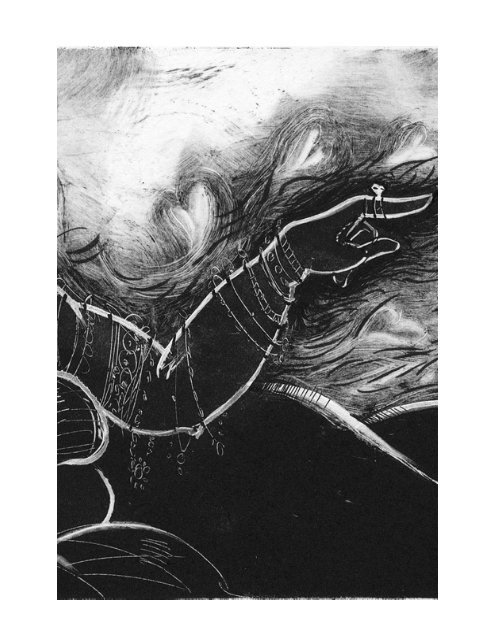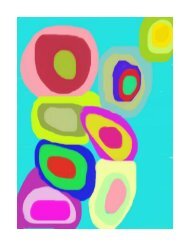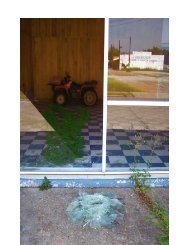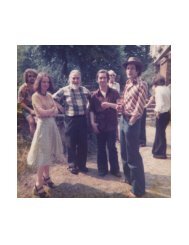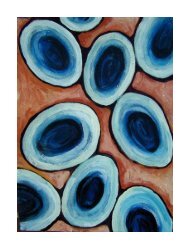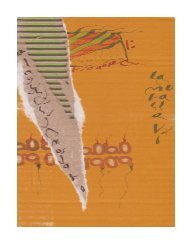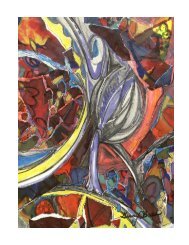Slight Return: Remix and Ekphrasis - The Argotist Online
Slight Return: Remix and Ekphrasis - The Argotist Online
Slight Return: Remix and Ekphrasis - The Argotist Online
- No tags were found...
You also want an ePaper? Increase the reach of your titles
YUMPU automatically turns print PDFs into web optimized ePapers that Google loves.
<strong>Slight</strong> <strong>Return</strong>:<strong>Remix</strong> <strong>and</strong> <strong>Ekphrasis</strong>Robert Archambeau<strong>Argotist</strong> Ebooks2
Cover <strong>and</strong> “Kafka Sutra” images by Sarah ConnerCopyright © Robert Archambeau 2011All rights reserved<strong>Argotist</strong> Ebooks3
<strong>Slight</strong> <strong>Return</strong>:<strong>Remix</strong> <strong>and</strong> <strong>Ekphrasis</strong>4
<strong>The</strong> Kafka Sutra[Source texts: Kafka’s parables <strong>and</strong> the Kama Sutra][Images by Sarah Conner]5
IntroductoryIn the beginning the Lord of Lords created men <strong>and</strong> women, <strong>and</strong> in the form ofcomm<strong>and</strong>ments in one hundred thous<strong>and</strong> chapters laid down rules for the proper governanceof the Dharma, Artha, <strong>and</strong> Kama. Those rules which treated of Dharma were disclosed bySwayambhu Manu; those governing Artha were compiled by Brihaspati; <strong>and</strong> those thatreferred to Kama were, such is the mystery of mysteries, expounded by Franz Kafka in onethous<strong>and</strong> parables. It is said he composed them on days following his return to Prague fromBerlin, where he traveled to visit his fiancé Felice Bauer. On such days Max Brod would oftenfind Kafka brooding over a small black notebook <strong>and</strong> the remains of his modest breakfast.Kafka revealed the contents of the notebook only after unrelenting rib-jabbing <strong>and</strong> tauntingby his friend, a service for which the literary world will forever be in Brod’s debt.<strong>The</strong> original notebook being lost, the sutras were reproduced from notes <strong>and</strong> memory by Brodin abbreviated form in five hundred chapters. This work was again lost, but not before beingprepared for publication in an abridged form of one hundred <strong>and</strong> fifty chapters by thatnotoriously renegade Hasid, Bohdan ben-Zalman, a kettle-maker <strong>and</strong> publisher of erotica,curiosa, <strong>and</strong> illicit literature. <strong>The</strong>se one hundred <strong>and</strong> fifty chapters were then put togetherunder seven heads or parts named severally:1 Sadharana (on general topics)2 Samprayogika (on rejected advances, etc.)3 Kanya Samprayuktaka (on advances not quite made in the first place)4 Bharyadhikarika (on rejection by one’s wife)5 Paradika (on rejection by the wives of others)6 Vaisika (on fear of approaching courtesans, <strong>and</strong> the memory of maternal injunctionsregarding disease)7 Aupamishadika (on the application of useless ointments)<strong>The</strong> few copies of ben-Zalman’s proofs having been variously suppressed, lost, destroyed,found, thoughtlessly repaired, amended, corrupted, ignored, <strong>and</strong> otherwise removed from thehistorical record, we find only these few fragments of the Kafka Sutra survive. <strong>The</strong>y are hererendered into English for the first time, that we may partake of their wisdom <strong>and</strong> vision.6
<strong>The</strong> Great Wall <strong>and</strong> the Tower of Babelfrom the BharyadhikarikaHe is to attain, through weeks of restraint, desire such that a tumescence is achieved scarcelyinferior to the unruined glory of the Tower of Babel <strong>and</strong>, as regards divine approval, notentirely at variance with that edifice. He lies supine, that the monument of his desire towersabove him.She lies next to him, on her side, her back toward him, her curves <strong>and</strong> lavish limbs <strong>and</strong> silkensurfaces forming in their long extension a Great Wall. She begins, softly, to snore.He sees now that the tower failed because it was bound to fail.8
An Imperial Messagefrom the ParadikaShe is an empress <strong>and</strong> sends him a message from the divan where, after the luxury of herbath, she stretches the magnificence of her flesh to be powdered by a favorite h<strong>and</strong>maiden.Her message, a summons of desire, is for him <strong>and</strong> him alone, her pathetic subject, a tinyshadow hidden at the farthest distance from her imperial sun. She orders her eunuch heraldto kneel down beside the heat <strong>and</strong> delicate scent of her breast, <strong>and</strong> drawing him near strokeshis shaved head with a h<strong>and</strong> whose soft tautness itself promises fulfillments undreamed of byeven the most jaded rakes among the courtly aristocrats. She whispers in the eunuch’s jeweledear words that cause him, a veteran of many years service <strong>and</strong> witness to countless debauchesof the court, to blush. At her comm<strong>and</strong> the messenger whispers the message back to her, thatshe may confirm its accuracy. <strong>The</strong> words bear such promise of pleasure that he trembles inmemory of his lost manhood. And there, in front of the attendant harem of h<strong>and</strong>maidens <strong>and</strong>silken ladies in waiting, she dispatches her herald with a comm<strong>and</strong>ing gesture of herbejeweled <strong>and</strong> opulent arm.<strong>The</strong> messenger starts off at once, a powerfully built <strong>and</strong> tireless servant. Eyes <strong>and</strong> jaw set indetermination, he elbows his way through the crowd of nubile bodies. Where he encountersresistance, he points to his breast, which bears the glittering sign of the imperial sun, <strong>and</strong> thecrowd parts for him. But the crush of bodies is immense; the imperial dwelling infinite. Ifthere were an open field, how he would fly along, <strong>and</strong> soon the intended would hear thepounding of his fist on the door. But instead, look how futile are all his efforts, how vainly hewastes his burly strength. He is still forcing his way through the private rooms of theinnermost palace. Never will he win his way through. And if he did manage that, nothingwould have been achieved. He would have to fight his way down the broad imperial steps,<strong>and</strong>, even if he managed to do that, still nothing would have been achieved, for the palace,which lies within the infinite city, has no end.Out in the provinces the intended lies supine <strong>and</strong> contemplates with sorrow the Tower ofBabel.10
Couriersfrom the Kanya SamprayuktakaHe is offered the choice of becoming a husb<strong>and</strong> or the lover of another man’s wife. Men beingas they are, he wants to be a lover, as do all the others. <strong>The</strong>refore there are only lovershurrying around the world, near-rabid with ardor <strong>and</strong> bearing their secret letters of desire.<strong>The</strong>re being no husb<strong>and</strong>s, though, there are no wives, so there is no one to receive theiramorous messages. Secretly they would all like to put an end to this miserable way of life, butfear commitment.12
Before the Doorfrom the VaisikaBefore the seedy entry to the brothel he finds a fat, greasy man on a discarded barstool.Having come from the countryside in great <strong>and</strong> urgent need, he asks the fat guard forentrance. But the guard says that it is not possible to admit him at just this moment. <strong>The</strong> manreflects briefly, then asks if he will be allowed to enter later on. “It is possible,” says thegatekeeper, “just not at the moment.”Since the door to the brothel st<strong>and</strong>s open, as always, <strong>and</strong>the guard has turned toward the wall a little to shield the cigarette he’s lighting from the wind,the man tries to catch a peek inside.Seeing him, the guard laughs. “If you are so strongly tempted, try getting in despite myprohibition. But take note: I am powerful. And I am but the lowliest of the guards: from hall tohall wait guards at every door, each more terrifying than the last. By the time I get to the thirddoor I can hardly st<strong>and</strong> to look at them myself.” <strong>The</strong> countryman has not expected this — thebrothel should be open to anyone prepared to pay. But when the man looks more closely atthe guard <strong>and</strong> his coat trimmed with fake fur, his floppy hat, his gold-capped cane, his pointedeelskin boots <strong>and</strong> his long, thin, black Tartar’s beard, it becomes clear that it would be betterto wait for permission. <strong>The</strong> guard has given the countryman a little three-legged stool, muchshorter than the barstool upon which his own bulk is massed, <strong>and</strong> gestures for thecountryman to sit there at his side. <strong>The</strong>re he sits for days <strong>and</strong> years, as the cold wind blowstrash through the city’s gutters. <strong>The</strong> man, who has equipped himself with many things for hisjourney to the city, slowly parts with everything he has, attempting time <strong>and</strong> again to bribe thegatekeeper. <strong>The</strong> latter accepts it all with a world-weary gaze, each time saying “I only take thisso that you won’t think there’s anything you forgot to try.”14
Parablesattributed to the Kanya SamprayuktakaHe complains that the words of the sutras are merely parables <strong>and</strong> of no use in real life:“When the sage has written ‘there she is, go get her, they’re never happier than when they’vegot one up in ’em, etc.’ the wise man does not mean that you should approach some actualhottie, but speaks of a philosophical Other, some transcendent object of ontological desire,something that the sage cannot designate any more precisely than we can. I mean, he can’tactually help us at all. All these parables really set out to say is that the ineffable is ineffable,<strong>and</strong> we knew that already. But the aches of earthly desire: that’s something else entirely.”She lies next to him, on her side, her back toward him, with her curves <strong>and</strong> lavish limbs <strong>and</strong>silken surfaces, <strong>and</strong> starts to snore.15
Manifest Destinies, Black Rains[Source texts: Anne C. Lynch, “A Sketch of Washington City,” Harper’s New MonthlyMagazine December 1852; Masuji Ibuse, Black Rain, 1965]16
With the broadest principles of freedom for the foundation of our government — with amagnificent country, whose shores are washed by the great oceans, whose lakes are seas,whose rivers are the most majestic that water the earth, whose commerce whitens every sea,whose railroads <strong>and</strong> canals, like great arteries, intersect its whole surface, <strong>and</strong> carry life <strong>and</strong>activity to its remotest corner; whose “magnetic nerves,” with the rapidity of thought, bearintelligence to its distant extremities; with a people springing from the fusion of many races,<strong>and</strong> whose energies are as inexhaustible as the resources of the country they inhabit, it wouldseem that here the human mind is destined to develop its highest powers, <strong>and</strong> that, while onone side its influence will roll back upon the tottering monarchies of Europe, on the other itsadvancing tide of freedom <strong>and</strong> civilization will stretch across the Pacific, to the shores of Asia,<strong>and</strong> pour upon them its fertilizing flood. —Washington17
We reached the streetcar stop at Kamiya-cho. <strong>The</strong> streetcar tracks crossed each other here,<strong>and</strong> broken overhead wires <strong>and</strong> cables hung down in tangled profusion over the road. I had aterrifying feeling that one or the other of them must be live, since these were the same wiresthat one usually saw emitting fierce, bluish white sparks. <strong>The</strong> occasional refugees who passedto <strong>and</strong> fro had the sense to crouch down as they passed beneath them.Mr. Omuro was a man of property, owning mills in three different places, as well as dabblingin calligraphy, painting, <strong>and</strong> art-collecting. I had visited the house myself several times duringthe past year for the benefit of his advice… Now, however, it was completely razed to theground. Where the main building <strong>and</strong> clay-walled storehouse had once stood was an aridwaste scattered with broken tiles. —Hiroshima18
[1-2]A man of property dabbling in painting <strong>and</strong> art collecting,a man of property whose commerce whitens every sea,a man of property with the broadest principles of freedom,a man of property whose railroads carry occasional refugees.20
[1-3]A magnificent country’s principles of freedom,completely razed to the ground.Where they had once stood an arid wasteScattered with broken tiles21
[2-1]Here, it seemed, the human mind was destined to develop its highest powers.Here, it seemed, in the inexhaustible country they inhabit.Magnetic nerves, with the rapidity of thought, bore intelligence to distant extremities. I had aterrifying feelingthe mind was destined to spark <strong>and</strong> tangle: fierce <strong>and</strong> white.22
[2-2]Here, with a people springing from the fusion of many races, the human mind is destined todevelop its highest powersof thought. Calligraphy, painting, art-collecting.An intelligence inexhaustibleas a man of property owning mills in three different places.23
[2-3]A people springing from many races is destined.A people springing from inexhaustible ground is destined.From fission, a distant people, razed.From fission an arid waste is destined, <strong>and</strong> broken tiles.24
[3-1]Stretched across the Pacific, tottering,we pour upon them, roll back on the tide.A terrifying feeling, advancing.Tangled, broken, we reach the fierce shores of Asia.25
[3-2]To the Pacific, to the shores of Asia,to pour upon them the sense of civilization,the sense of freedom advancing. On one side of the floodthe tottering refugees had the sense to crouch.26
[3-3]Now, where the tottering had stood,clay-walled Asia was completely razed to the ground.<strong>The</strong> storehouse scattered, brokenin the advancing tide, the fertilizing flood.27
Diptych: Punk <strong>and</strong> Glam[Source texts: <strong>The</strong> Ramones, Mick Rock’s photo of Ziggy, Iggy, <strong>and</strong> Lou]28
Sheena is a Punk RockerShe, Sheena of the Jungle, the pulp-paged comics’ great white queen,she, Sheena, born in slumped-out Engl<strong>and</strong>, bornfor young Will Eisner’s tabloid-writing scheme,born of Jerry Eigner’s drawing, Eisner’s jiggle-in-the-jungle dream.Reborn stateside nine months later (the money was better),reborn a soft-core smash-hit shiksa, Jumbo Comics break-out dame.Born first in the blur of Eisner’s novel-reading dreaming —she, Sheena, born first in Rider Haggard’s one-h<strong>and</strong>-novel She.Sheena born in the blur of the movie-goer’s dreamingwhen Jeffrey Hyman (he’d drop Jeff, <strong>and</strong> go by Joey,he’d drop Hyman, <strong>and</strong> then go by Ramone) caught herin a seedy New York retro matinee:kitsch TV for downtown’s nascent highbrow-lowbrow scene.She, Sheena of the big screen, born Nellie McCalla,born the butcher’s daughter (fifth of eight), she couldn’t stayin dull Pawnee, hopped it from her butcher father,hopped the train from dull Pawnee.Reborn in chic L.A., she, Sheena, she’d drop “Nellie,”29
pose for Vargas, pose it well <strong>and</strong> beach-front, pose it well, <strong>and</strong> not for free.“I couldn’t act,” says Sheena, “but I could swing from trees.”A pinned-up blonde, improbable as jungle queen,improbable as her build, her frame, her curving fame, as in:her 39-19-37, she, Sheena,a big-screen screen-test six-foot queen.She, Sheena, born again when Jeffrey (call him Joey) madehis infinitely probable 2 minutes forty, his infinitely perfectfour-chord chart-this scheme. Teens drive it up to 81,in Engl<strong>and</strong> make that 23. <strong>The</strong> hopped-up numbers screamthey know it: Sheena is a punk rocker, Sheena isa punk rocker, Sheena is a punk rocker now.30
Glam Rock : <strong>The</strong> Poem1<strong>The</strong> man who was to fall to earth in four years' timestill floated in his cloud of silvered fame. His namewas David Robert Hayward Stenton Jones.He'd been a Kon-Rad, King Bee, Manish Boy,a Lower Third. He'd be a thin white duke.He'd be a Christ, an alien, he'd be a dance club king.Remembering the self-invented master whose factoryinvented selves, he'd play in film the man whoplayed the soup-can trick on art, he'd play that man (not well).He'd play the husb<strong>and</strong> of a wife -- she, born Somali,she, born near Greece. He, born in Bromley, had onereal wife, she, born in Bromley, her girl's-mouth his,the marriage bed that sweet narcissus mirrorwhere he'd play out all his parts.<strong>The</strong>se fragments has he shored against his gender, so.His name was David RobertHayward Stenton Jones. Not David Jones, too close to Davey31
of the pre-fab four. He'd change it first to Tom Jones, then again<strong>and</strong> then again. But this year he was Ziggy,this year he played guitar.That's him on the left. <strong>The</strong> man who'd fall to earth,camp in his arm-crook, his long neck's arch. Queerin his gilded studied falsely vapid stare.Nervous: glam <strong>and</strong> poise.<strong>The</strong> others? That year he'd save them both.32
2So New York <strong>and</strong> yet he's called "L.A."when he fronts the Eldorados at a dance. He'd been a Jade,be mother nature's son, but been a Jade who sanga doo-wop plaintive "Leave Her for Me."And she was Lisa <strong>and</strong> she'd say. And she was Stephaniewho'd also say. And she was Jane <strong>and</strong> C<strong>and</strong>y too,or she would be. But he was Delmore Schwartz'sbest student, gone to smack <strong>and</strong> speed <strong>and</strong> hell,<strong>and</strong> he'd come back. He'd play the White Housefor two presidents, one ours, <strong>and</strong> onethe velvet revolutionary who'd call him the Velvet Underground'sown JFK, own wild-side walking Mao or Che.A three-chord Che? No martyr -- though he'd bottom out.He'd always be the cracked-id isl<strong>and</strong> suburb kid who double-codedhis libido's twists in "CHD," his high school b<strong>and</strong>: the backward-reading acronymfor Dry Hump Club: three boys, a girl, <strong>and</strong> one guitar.One guitar lesson's all he'd need, a Carl Perkins 1-4-5 he'd play.He'd play too much with fire, the kindhis "mashed-faced Negro friend, called Jaw"33
sold him, with hepatitis, early on.He'd play five years with his best b<strong>and</strong>.He'd leave <strong>and</strong> play out on his own (not well).He's on the right, behind his shades, behind the junkie actin which the junkie hides.Nervous: cold-edged poise.Bowie'd helped him make Transformer.Reed's cracked id made his music well again.34
3He'd write "China Girl," <strong>and</strong> he'd sing "Shades"the second time the thin man fell to earthto scoop him up. His name was Pop. Had been Osterberg, hadbeen Prime Mover, had briefly been Iguana,would then be Pop. Twice called by Stooge, firstpsychedelic, later (times where changing) not.<strong>The</strong> Idiot who'd Lust for Life. Like the Velvetsbut not all cerebellum: all burnout, bastard, broke-ass bum.A pack of Luckies in his teeth. His arms around them both,a drunken-sailor Jesus carried, his forward thrust<strong>and</strong> their support. His eyes say "yes" his eyes say "now"his eyes say "no one drives this drunken car." And they're in love.<strong>The</strong> attraction? <strong>The</strong> man called Stardust, star-struck, said"not Iggy in but Iggy <strong>and</strong>," <strong>and</strong> the Stooges drop to second bill,while Iggy's resurrected (still on smack).<strong>The</strong> wonder of attraction? Not his chops --he tried for ten months, played Chicago blues (not well).And not his lyrics, his "Mona" or his "TV Eye". Raw Power. For this,Ziggy'd play his management, get Ig a gig, a big release.35
Lou Reed gave his producer: chops, technique, tribute, <strong>and</strong> joy.<strong>The</strong> wonder of attraction?Not nervous, not with poise, not him.No one to drive the car.436
Perspective's trick's a little imp behind their shoulders:Tony Defries. He, thinking"Hammersmith Odeon" thinking "aren't theyfun!" He, thinking, too " but will it sell?"<strong>and</strong> then he's smiling,thinking,"yes."37
La B<strong>and</strong>era[Source text: card #16, “La B<strong>and</strong>era,” the flag of Mexico, from the traditional Mexican cardseries “La Lotería]38
It’s in America (that is, the U.S.A.), that I have l<strong>and</strong>ed,clutching my cars <strong>and</strong> TIAA-CREF,my yellow-shingled house perched on its acre lot.Which means? Which means? Which means the things I’ve seenare wonderful, <strong>and</strong> sinister,<strong>and</strong> many, many are the spangled flags.I have seen them by the lakes <strong>and</strong> oceans, stiff,with growing confidence, high in air; I have seen themon the beaches, the l<strong>and</strong>ing grounds, I have seen themin the fields <strong>and</strong> streets. <strong>The</strong>y will never surrender.I have seen them on ball-caps, plastic cups, on napkins(on days not yet the fourth, in months not yet July),seen them brazen on the mud-flaps of eighteen-wheelers,on the foil packets of moist towelettes <strong>and</strong>, once, once, a pair of them,tattooed on a stripper’s spreading, well-toned inner thighs.(Once? No, twice. Oh furtiveness, oh sneaking back).I have seen Canadian flags, but they were in Canada,<strong>and</strong> on flag poles, too. <strong>The</strong>y do things differently up there.I’ve seen, too, la b<strong>and</strong>era, the flag of Mexico.With its eagle, born before Columbus, born as the sun.Born for Tenochtitlan.<strong>The</strong> eagle’s claw-clutched serpent born for Aztecs,40
who called it wisdom,born with a hiss called “whispered truth.”Later, born again for brazen Spaniards, <strong>and</strong> born royal:águila real, the eagle clutched the writhing pagan serpent, <strong>and</strong>perched brazen in the center, in the white field of the revolution’s tricolor.Which means? Which means? A sneaking inof church <strong>and</strong> crown, surviving, there (they never surrender)surviving, brazen — a claw hangs on.But that’s not where I saw them, not at first.I saw them on my father’s forearm, saw them, tattooed, there.Saw them as both wonderful, <strong>and</strong> sinister. Saw them,<strong>and</strong> didn’t know. And didn’t know how, back from the Marines— back from the beaches, the l<strong>and</strong>ing grounds,the fields <strong>and</strong> streets, the never surrender — he swore offthe l<strong>and</strong> of yellow-shingled houses, <strong>and</strong> all their acre lots,took flight for Mexico, <strong>and</strong> beatniked there.His perch, where he had l<strong>and</strong>ed, <strong>and</strong> for good,or so he thought. And then? And then?A furtiveness? A sneaking back.A spreading l<strong>and</strong> of many spangled flags.41
Robert Archambeau’s books include Word Play Place (Ohio University Press), Home <strong>and</strong>Variations (Salt), <strong>and</strong> Laureates <strong>and</strong> Heretics (University of Notre Dame Press). He is the coeditorof <strong>The</strong> & NOW Awards: <strong>The</strong> Best Innovative Writing (Lake Forest) <strong>and</strong> the editor ofLetters of Blood <strong>and</strong> Other English Writings of Göran Printz-Påhlson. His writing hasappeared in Poetry, Boston Review, Chicago Review, PN Review, Pleiades, CambridgeLiterary Review, Contemporary Literature, <strong>and</strong> many other journals, <strong>and</strong> he has receivedawards from the Academy of American Poets, the Illinois Arts Council, <strong>and</strong> the SwedishAcademy. He is professor of English at Lake Forest College (Illinois) <strong>and</strong> blogs atsamizdatblog.blogspot.com.42


